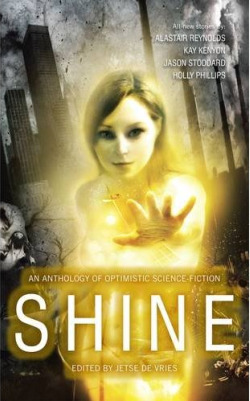 It’s nearing the submission deadline for the Shine Anthology, and editor Jetse de Vries has heard every excuse under the sun from science fiction writers who cannot or will not write optimistic near-future science fiction stories. Indeed, he’s heard enough of them to taxonomise them into seven distinct categories, to which he has posted a lengthy rebuttal on the anthology blog. [image by streamishmc]
It’s nearing the submission deadline for the Shine Anthology, and editor Jetse de Vries has heard every excuse under the sun from science fiction writers who cannot or will not write optimistic near-future science fiction stories. Indeed, he’s heard enough of them to taxonomise them into seven distinct categories, to which he has posted a lengthy rebuttal on the anthology blog. [image by streamishmc]
The excuses – and he really does see them as excuses – are as follows:
- (Deliberately) misinterpreting the meaning of ‘optimistic SF’.
- Optimism is not realistic.
- You cannot predict the near future exactly, so you might as well not try.
- There is no possibility for conflict in a full-on optimistic future.
- I can’t do it because we live in dire times.
- My downbeat SF story is meant as a cautionary tale.
- I will not confirm to your positivist agenda: nobody tells me what to write.
If you’re at all interested in short form science fiction, you should read the whole thing, but here are some excerpts from the post:
This is a defence mechanism: most SF writers don’t want to write something that is too difficult, too risk-taking, and – dog forbid – relevant. They just want to write about something they find cool, and will throw up a barrage of excuses just to keep doing that. Those excuses are often dressed up as reasonable arguments, but more often than not what they really imply is: “Hey, I don’t want to this near future, optimistic stuff: I just want to stay in my comfort zone.” And indeed, that’s what most dystopias are: a comfort zone for unambitious writers.
[…]
There is a myth in writing circles that writers really like a challenge: tell a group of writers that they can’t do something and by golly, they will show you they can. Well, that myth is only true for simple challenges, like when Gordon Van Gelder said he didn’t like elves: immediately half the writing community brainstormed brilliant elf stories that would leave Gordon breathless.
However, now that I’m throwing out a real challenge – near future, optimistic SF – the utmost majority of the SF writing community is enormously reluctant at best, and downright dismissive at worst. Obviously, this is a challenge that doesn’t count. Well, I’ve got a message to all those writers who think they can ignore this challenge: get real, that is: look around in the real world.
[…]
There is a huge imbalance between pessimism and optimism in written SF today: the genre is overwhelmingly bleak. With Shine I’m trying to redress that lopsidedness somewhat. It’s a challenge: try your hand at this for just one short story only. But the general impression I’m getting from the SF ghetto is that ‘you’ll have to pry the pessimism from my cold, dead hands’ (exceptions acknowledged, of course). And indeed, if SF stops trying out new avenues, if it stops renewing itself, if it will not take risks, if it does not try to be relevant, then it will die.
At which point it can keep its bleakness.
The genre’s antipathy to change and new ideas is an observable phenomenon – one only need look to the backlash that Mundane SF produced for the proof – and Jetse’s dismantling of the seven excuses is lucid, logical and provocative. Essentially, all the defences boil down to one: I don’t wanna. And that’s fair enough, I guess – though it does somewhat put the lie to science fiction’s claim to be the foremost literature of the imagination.
There is one other excuse that Jetse misses off his list, though, possibly because it’s more honest than the others. As James “Big Dumb Object” Bloomer puts it:
I’ve been trying and it’s really bloody hard! […] the three months I’ve been trying to write optimistic stories are not enough, I have a feeling that it’s a life time’s work. I’m not going to give up though.
Kudos to him for that – any sort of change takes effort and will, after all.
So, all you writers among Futurismic‘s audience: do you have an excuse that’s not on Jetse’s list?
 Shine: An Anthology of Optimistic Science-Fiction by Jetse de Vries (ed.)
Shine: An Anthology of Optimistic Science-Fiction by Jetse de Vries (ed.) The SF Signal gang have turned over the microphone (er, keyboard) to Charles Tan to publish a set of interviews with the authors whose stories appear in
The SF Signal gang have turned over the microphone (er, keyboard) to Charles Tan to publish a set of interviews with the authors whose stories appear in  It’s nearing the submission deadline for
It’s nearing the submission deadline for